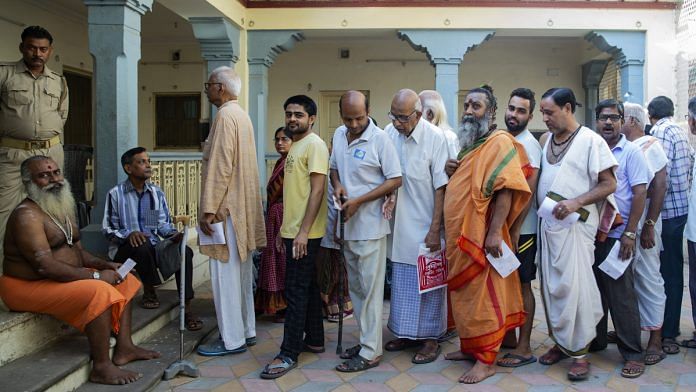Scholarship on “retrospective voting” has found that voters punish governments for exogenous events, such as natural disasters, terrorist attacks, or crime waves. In studies from the United States and India, for example, there is a robust relationship between floods or droughts and an electoral backlash against the incumbent. However, the relationship appears to be complicated by the government’s ability to provide voters relief.
We argue that certain incumbent politicians are systematically better positioned to provide relief to their constituents. This variation shapes incumbents’ likelihood of being punished for natural disasters. In particular, because local politicians are often dependent on the assistance of policymakers at the state or national level, local officials who are aligned with politicians at higher levels of government are advantaged in efforts to obtain relief funding. As a result, incumbents who are aligned with the party in power at the state or national level will be less likely to be electorally punished in the aftermath of a disaster.
Existing studies tend to focus either on the effects of disasters on electoral outcomes or on the political determinants of relief. Other studies find that relief mitigates electoral backlash, and investigate voter preferences over relief allocation. However, existing studies leave open the question of why some politicians are able to provide more relief than others. Our theory provides a unified explanation, at least within this institutional context, that links these disparate phenomena – natural disasters, the ability to provide relief, and electoral outcomes – by addressing a key condition under which relief is more likely: when incumbents have allies in the party in power in the state or national government.
To test this theory, we used monthly values of the climatic water balance for India’s 4,313 state electoral constituencies during the 1977-2007 period. The advantage of our approach is that we could measure weather patterns in political constituencies – the relevant electoral unit – instead of the much larger administrative districts. We can also support our identifying assumptions by showing that constituency characteristics, based on a comprehensive enumeration of all Indian villages from the 2001 Census, are not correlated with abnormal weather.
Also read: Indians vote on caste, religion because they lack information on MP, MLA performance: Study
Voters punish opposition MLAs
We show that voters penalise incumbent politicians (MLAs) for natural disasters. However, the logic of these penalties is fully consistent with retrospective voting: the punishment is limited to opposition incumbents – those who are not aligned with the nation’s prime minister or the state chief minister. Moreover, the effects are large – non-aligned incumbents during severe weather anomalies lose 2% to 5% of their vote share. Finally, results are not driven by differences in incumbent quality; the results are robust to including incumbent candidate fixed effects.
We also shed light on the mechanisms of electoral backlash. First, we demonstrate that drought and heavy rainfall do not affect voter turnout. Instead, voters move their support from non-aligned incumbents to other candidates. Second, using household data, we show that drought and heavy rainfall are associated with a reduction in people’s confidence in politicians. Finally, the same household data demonstrates that people who have access to relief are less likely to punish politicians for natural disasters.
Also read: Both Hindus and Muslims want development. But that’s where the similarity ends
Implications for democratic accountability
The findings provide new insight into natural disasters and voting behaviours in a federal structure by showing the role of political alignment across different levels of governments in disaster response. While several studies have theorised how a federal system affects voting decisions and suggested the conditions under which voters attribute blame to local governments in the wake of natural disasters, such as salience and direct experience of the events, existing studies have generally overlooked the implications of political alignment. Our study, however, shows that structural advantages from political alignment, leading to greater relief assistance, is an important explanatory variable for voting decisions after extreme weather events. Disasters negatively affect the electoral fortunes of incumbents, but only those who are unable to provide relief. This inability is itself a function of politics, as incumbents who are members of the same party that controls the chief minister or prime minister’s office can reap the rewards of their alignment.
The implications for democratic accountability are troubling. If people punish non-aligned incumbents, they are not rewarding disaster relief in a rational, forward-looking sense. Instead, they are naively punishing non-aligned incumbents for forces beyond their control. In Cohen and Werker’s (2008) model of responding to natural disasters, governments have incentives to withhold relief from areas controlled by the political opposition, and we provide evidence for these incentives. Not only does the government have an incentive to focus on areas that it controls, but it also has an incentive to penalise areas that have elected members of opposition parties to the state assembly.
Brian Blankenship is Assistant Professor of Political Science at the University of Miami, US.
Ryan Kennedy is an Associate Professor of Political Science at the University of Houston, US.
Johannes Urpelainen is Prince Sultan bin Abdulaziz Professor of Energy, Resources and Environment (ERE) at the Johns Hopkins School of Advanced International Studies, US.
Joonseok Yang is Assistant Professor of Political Science and Diplomacy at the Sungkyunkwan University, South Korea.
This is an edited excerpt from the authors’ paper ‘Barking Up the Wrong Tree: How Political Alignment Shapes Electoral Backlash from Natural Disasters‘, first published in SAGE journals.




As long as the general public doesn’t understand who should they penalize after natural disasters, they deserve to face the consequences. However troubling such reports may be, in democracy it’s the people who still have the authority who to blame and who not to. The only problem is their decision is not mature which we should all hope the public will learn.
Very interesting insights.